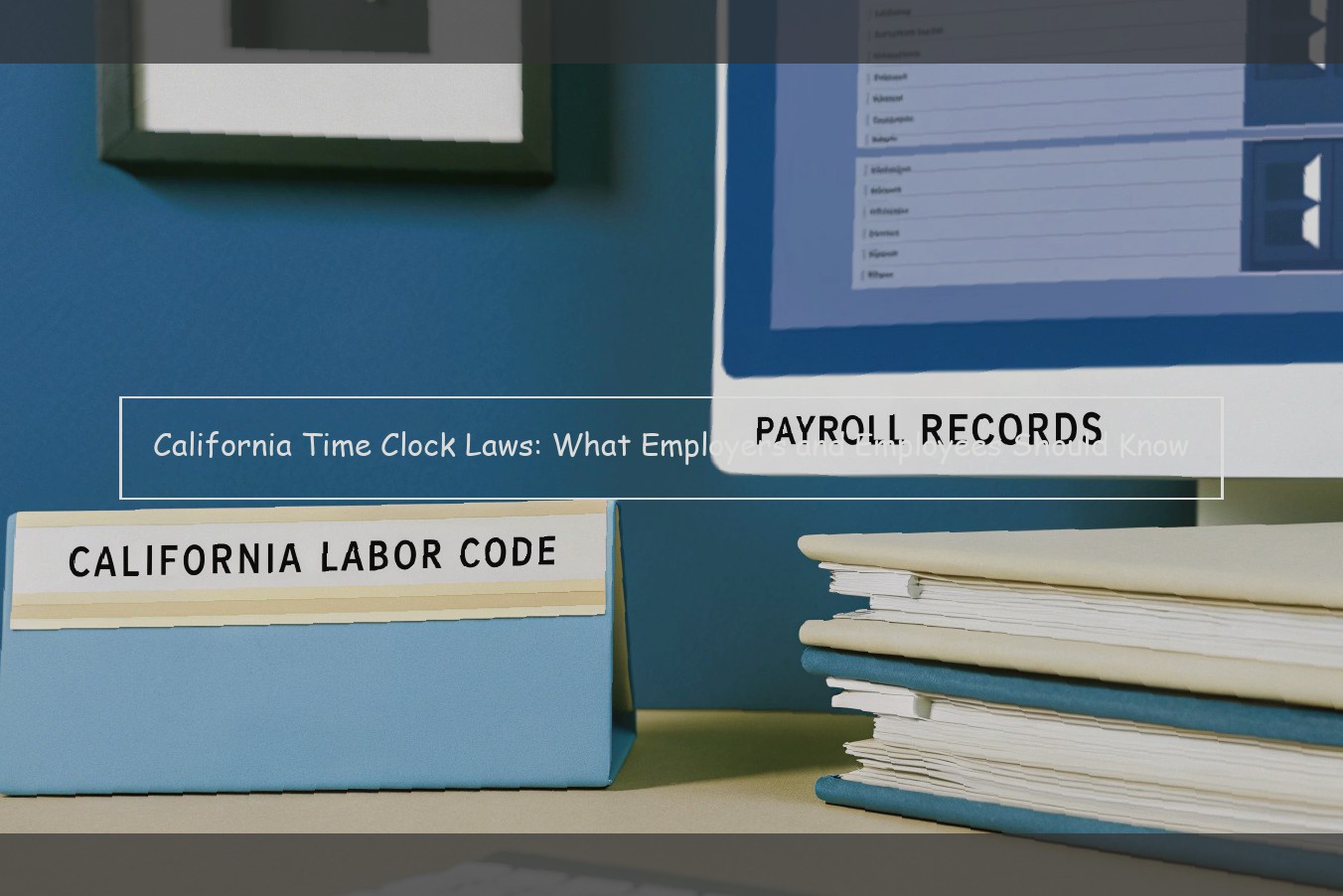Overview of California Time Clock Laws
As a foundational component of employee recordkeeping requirements, time clock laws are critical for both employers and employees in California. Unfortunately, the nuance of time clock laws can make them challenging to identify and comply with, particularly given recent adjustments to overtime laws. Familiarizing both employers and employees with the scope of time clock laws as a means of ensuring compliance is valuable for all California businesses. The adoption of time clock laws by California state law is considered an important step in providing protections for the majority of employees. Prior to the passage of time clock laws, it was up to the mutual agreement between employers and employees to determine the timekeeping process within the workplace. Employees who had difficulty making timely punches may not have received any compensation for the time that was worked but went unverified through time clock records. On the flip side , employers who lacked sufficient oversight of their timekeeping processes may have experienced significant abuse of their labor policies. Time clock laws were consequently created as a compromise to protect employees from unfair labor practices while still allowing businesses to enforce strong timekeeping policies without concern for liability issues. Time clock laws offer employees protection from two primary threats: wage theft and unpaid overtime. The range of time clock laws manifest accordingly, addressing a variety of situations by which such damages could be incurred. There are additional protections for employers provided under time clock laws, who now must be familiar with potential issues related to employee’s time punches. For example, the process for entering a late departure would be required under time clock laws to prevent liability from accruing. Another example would be: an employee is a victim of workplace violence and knocked unconscious, his time clocked out before he departed. As a means of avoiding liability, even if time is inaccurate, employers may be obligated to pay a worker for the entire shift.

California’s Wage & Hour Laws
California’s wage and hour laws also stipulate that employers pay non-exempt workers time-and-a-half for all work in excess of eight hours per day and the first eight hours on the seventh consecutive day worked. Any work beyond that is paid at double time. Employees are entitled to one hour of "premium pay" as a penalty if their employer did not provide mandated meal and rest breaks. Wage theft claims are on the rise in California and such lawsuits are often civil in nature, though any fines or back pay ordered due to them can also be substantial.
Timekeeping Requirements
California employers also have a mandatory requirement to keep time records. California Labor Code Section 1174(d) requires that every employer keep, for at least three years, payroll records showing an employee’s name, address, and social security number, the employee’s time of hire, his or her regular hourly wages and premium rate of pay, all meal periods, all dates worked, all total daily straight time and overtime hours worked, all employee sick leave dates and sick leave hours worked, all amounts deducted from his or her wages, and the cumulative taxes withheld. Since California courts can impose Civil Code section 1234 mandatory statutory damages of up to $750 per pay period if the employer fails to keep any of the required records, if an employee requests time records, either during an authorized audit of records or six months following termination, the employee’s new employer should be made aware of this fact so that they can safeguard the records and avoid such claims.
Time Clock Policy Tips
Employers should adopt time clock policies consistent with their industry and the employee population. They should seek to ensure that employees understand how to properly use time clocks, and for what purpose clocks are used. For example, employers would be wise to remind employees that their time is being recorded for accurate payment of wages, and not for any other purpose.
In certain non-exempt work settings, clocking in and out regularly may only be necessary when breaks are scheduled, or at the beginning and end of each work day. In these instances, employers can avoid non-compliance issues by clarifying with employees their expectations for clocking breaks, clocking in and out for lunch, exit for personal matters, etc. Candid discussions with employees about their time clock practices may help ensure all concerns are addressed proactively.
Some employers may adopt and implement time clock policies and procedures that require an employee to check in and out of the clock throughout his or her workday (i.e., when entering and exiting the break room, hallway, restrooms, etc.). While this may be necessary for some employers based on required California wage and hour law compliance, not all employers should use this method of timekeeping. The primary goal for an employer should be to maintain accurate records of the hours worked by non-exempt employees, and to treat employees equitably in its timekeeping policies and procedures. Clocks in and out throughout the workday may result in excessive rounding if not tied to the work day – making it less likely for the employee to round up/down for short, sporadic breaks of time. As such, an employer may wish to consider how its timekeeping policy applies to non-exempt employees; and whether employees are able to follow the policy relatively easily, often, and without confusion.
Penalties for Violating California’s Time Clock Laws
Employers found in violation of California Time Clock Laws may face administrative and civil penalties. California law mandates that all wages owed be paid to employees. Failing to pay an employee the correct amount of wages may lead to a civil action suing for damages. If the employer has failed to remit the correct deduction with respect to an employee’s wages, the employer may be subject to a civil penalty: "If an employer willfully fails to remit an employee’s or former employee’s final wages within 30 days of their due date, the employee or former employee may recover, in addition to the wages, an amount equal to the unpaid wages as a penalty. The penalty shall be calculated at the rate of $100 for each part of each day that the wages remain unpaid." (Labor Code §210) If an employer is repeatedly found to be in violation of the law it may be held liable for a "excessive civil penalties." Employers must pay missed meal and/or rest periods resulting from employer policy which would be considered as part of the "wages" that the employer must pay the former and/or current employee. (Ashley B. v. Contra Costa Cnty. Dept. of Children & Family Servs. (2003) 113 Cal.App.4th 254) Similarly, penalties may be found due if the employer conducts willfulness in violating the governing laws. In California these violations of time card regulations or laws are enforced by the Labor Board. An employee may submit a complaint to the labor board that his/her employer has breached his/her rights to their time to work laws . Following a review of the validity of such claims the Labor Board may either bring charges against the employer and pursue a civil suit or settle the case with the employer and the employee. Failure to comply with the California minimum wage law can get employers both administrative and civil penalties. In conclusion, an employer can expect a civil suit and administrative fines should they not comply with California minimum wage laws set forth. In Campbell v. Soc. Chance Res. & Dev., Inc. (2010), the judge orders that an employee received over $50,000 in damages against his temp agency for not receiving the required minimum payment for all the days he had worked. The plaintiff employee was hired to work to only as needed and was not issued a specific work schedule that exampled his rest breaks and meal periods as required by California Labor, yet he was recorded as having four hours off each day and being paid the same minimum payment per day regardless of how long he worked. "The trial court awarded penalties based on an average of four hours of unpaid wages in addition to the CALIFORNIA LABOR CODE section 226 deductions. … As for the $200 per day amount of the penalties, reasonable minds may differ as to what is ‘reasonable’, but the employee’s failure to receive even his unpaid wages, let alone overtime premium pay when he worked more than eight hours a day, leads this panel to conclude that the discharged employee here was denied entire days’ worth of wages." (Campbell v. Soc. Chance Res. & Dev., Inc. (2010) 178 Cal.App.4th 890.)
Employee Rights & Protections
Employees and their representatives have a number of essential legal rights under California law in relation to time clocks that are designed to protect against employer abuse. The following is a non-exhaustive list of such rights and protections:
- Employers may not alter time clock entries without the employee’s consent;
- Employees have the right to review, obtain copies of, and dispute their time records. Upon an employee’s request, an employer must make copies of an employee’s records available for review with no timekeeping or recordkeeping system. In practice, for electronic records, timekeeping systems must be made available for on-site review;
- Employers may not force or retaliate against employees for clocking out for breaks according to company policy, or otherwise taking breaks as required by law;
The California Labor Code provides a number of specific protections and enforcement mechanisms to ensure that employers abide by the law. For example, where employers fail to pay wages on time, employees may have a civil cause of action under PAGA and/or in court to recover the amounts due and incurred interest. The Labor Code also allows the Labor Commissioner to enforce the law on behalf of employees and impose penalties on such employers who violate employee rights. Union representatives may also file claims with the Labor Commissioner, as may (in certain circumstances) employees who are not members of a union.
Updates & Changes
The last few years have brought some good news and bad news for employers in California. First, the California Supreme Court has become more employer friendly. For example, long maligned anti-waiver laws that invalidated attempts to enter into arbitration agreements were overruled in favor of upholding valid arbitration agreements. These cases include Iskanian v. CLS Transportation Los Angeles LLC, 59 Cal.4th 348 (2014) (employee cannot bring a PAGA representative action even if the employee also alleged an individual claim for wage and hour violations); OTO, LLC v. Kho, 8 Cal. 5th 111 (2019) (court must scrutinize any waiver in any arbitration agreement that is obtained through employer intimidation or coercion); and Epic Systems Corp. v. Lewis, 584 U.S. ___ (2018) (arbitration waivers in employee agreements enforced even if results in employees waiving their right to engage in collective activities).
However, just as employers are breathing a sigh of relief, bad news reigned down upon California employers. For example, a crackdown on the so-called "independent contractor" status of workers has put the employment status of thousands of workers, such as gig economy drivers for companies like Uber and Lyft, into limbo. See Dynamex v. Superior Court, 4 Cal. 5th 903 (2018) (new test for independent contractor status under California law to determine who qualifies as an employee).
Other recent cases involve the misclassification of exempt, salaried employees under California law, and have had bad consequences for employers. See Alvarado v. Dart Container Corp. Of California, 4 Cal. 5th 521 (2018) (supreme court decision which damages based on allegedly improper overtime calculations under California Labor Code Section 510 from exempt, salaried employee did not have to be at least 10 percent of the employee’s compensation during the time frame in question, but could be based on a lesser percentage); Hartung v. KW Plastics, 88 F.3d 1014 (9th Cir. 2018) (pro rata basis of overtime payment for exempt employee did not violate the California Labor Code).
Finally, on a practical note for employers, recent changes to California wage statement requirements now list new items that are required to be listed on wage statements (such as the name of the employer and different information that can be aggregated). These changes make it even more important for employers to be aware of what must be included on California wage statements and ensure that they comply. See Ramon v. Anaheim Arena Management, LLC, 41 Cal.App.5th 989 (2019) (additional information that can now be aggregated is the hours worked during any particular pay period, such as the number of regular, overtime and double time hours worked).
Consult with an Attorney
Businesses of all sizes should consider running their timekeeping practices past a lawyer specializing in California employment law to ensure that they are both compliant with state regulations and that their employees have the proper tools for accurately recording their working hours. This is especially true in any business that has had problems in the past due to errors in timekeeping or calculation of pay, as adjustments made following an audit or as the result of an employee complaint could potentially result in a considerable payroll adjustment . Though many timeclock and payroll systems are capable of carrying out even complex calculations of hours worked and wages owed, it is ultimately the responsibility of the employer to verify that this technology is being utilized correctly and effectively on behalf of their workers. An employment lawyer with extensive experience helping businesses in California can guide an employer on the correct use of any such technology, or in making adjustments to their current timekeeping practices to account for unique circumstances within the business.



